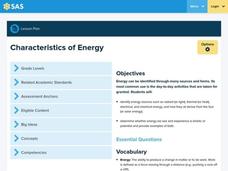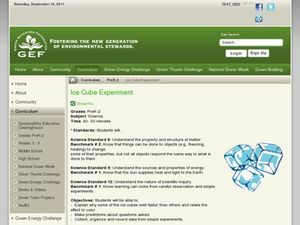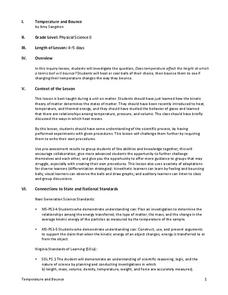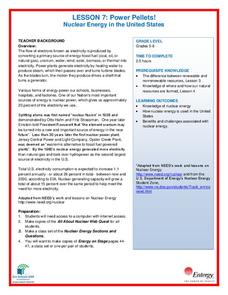Curated OER
Thermal Energy
In this thermal energy worksheets, students will read 4 different examples of thermal energy and then write in what the effect that example has based on what they read.
Curated OER
Thermal Energy
In this thermal energy worksheet, students read 2 statements about thermal energy. Students write in the effect of the statements. This worksheet is a graphic organizer.
Curated OER
Temperature
Several slides compare different temperature scales. Thermal expansion, heat transfer, and Maxwell speed distribution are also explored. The last two slides seem unrelated to the topic of heat, but are easily left out of this otherwise...
Colorado State University
If Hot Air Rises, Why Is it Cold in the Mountains?
Investigate the relationship between temperature and pressure. Learners change the pressure of a sample of air and monitor its temperature. They learn that as air decreases its pressure, its thermal energy converts to kinetic energy.
Next Generation Science Storylines
Why Do Some Things Get Colder (or Hotter) When They React?
Some reactions absorb heat while others release it. Young scholars investigate both types of reactions in a 12-lesson unit. Each lesson presents a lab investigation that monitors temperature and considers the types of reactions taking...
Curated OER
Temperature and Thermal Energy
In this temperature worksheet, learners answer 8 questions about temperature and thermal energy. For example, "What term refers to an energy transfer that causes a change in temperature?"
Curated OER
Characteristics of Energy
Fourth graders view a video and create a KWL to identify energy sources. In this energy sources lesson, 4th graders explore the meaning of energy, kinetic energy, potential energy, thermal energy, radiant energy, and electrical energy....
Curated OER
How is Thermal Energy Transferred?
In this thermal energy worksheet, students will write down the key facts and vocabulary words associated with heat and thermal equilibrium, transfer of thermal energy, conductors and insulators, and heat capacity. This worksheet is a...
Curated OER
Ice Cube Experiment
Young scholars explore the rate at which ice melts. In this science lesson, students place ice cubes on colored index cards and place them in direct sunlight. Young scholars observe which ice cubes melt fastest and slowest.
Curated OER
Measuring Solar Energy
Students study solar energy and how to measure it. In this energy sources lesson plan students complete a lab, obtain data and use that to convert surface temperature to energy.
CK-12 Foundation
Hot Oven
Why does the air in a hot oven not burn skin, but metal in the oven does? The simulation focuses on the difference between temperature and thermal energy and the way these are transferred. Scholars adjust the temperature of an oven and...
Discovery Education
It's Melting!
It's a race to the finish! Which ice cube will melt the fastest? Scholars discover the effect thermal energy has on melting ice. They experiment with melting ice cubes on different materials and learn that even at a consistent...
Space Awareness
Oceans as a Heat Reservoir
Oceans absorb half of the carbon dioxide and 80 percent of the greenhouse gases released into the atmosphere. Scholars learn how and why the oceans store heat more effectively than land and how they help mitigate global warming. Pupils...
Curated OER
Good Vibrations Remote Sensing data Collection: Thermal Emission Spectrometer
The Mars Global Surveyor spent two years creating a mineral map of the planet Mars using thermal emission spectrometry. To help young astronomers understand this remote sensing instrument, have them simulate how data is collected and...
National Energy Education Development Project
The Science of Energy
Did you know the word energy comes from energeia, a Greek word? Introduce learners to the four types of potential energy, five types of kinetic energy, and energy transformation with a presentation about where we get our energy and...
Chemistry Collective
Virtual Lab: Coffee Problem
Would you like milk with that? Young scientists consider thermal energy transfer to create the perfect cup of coffee. They calculate the amount of milk needed to reach a specified temperature and then test their calculations using a...
STEM for Teachers
Temperature and Bounce
Take part in a fun experiment and hold an impromptu bouncing contest with your class. Young scientists heat and cool balls before bouncing them to determine whether temperature changes affect how they bounce. The set of...
Colorado State University
How Does the Earth Cool Itself Off?
Where does all the heat go when the sun goes down? An interesting lesson has learners explore this question by monitoring the infrared radiation emitted over time. They learn that hot spots cool more quickly that cooler spots.
Texas State Energy Conservation Office
Investigation: Building a Parabolic-Trough Collector
Amateurs of alternative energy build a mini parabolic-trough solar energy collector and use it to heat water. Temperature is recorded over a three-minute period and the data is graphed and analyzed. Note that in order to paint aquarium...
National Wildlife Federation
Power Pellets! Nuclear Energy in the United States
Nuclear power provides about 20 percent of the energy generated in the United States. The seventh activity in the series of 12 tackles nuclear power. After sharing what they know about nuclear energy, scholars complete a...
Curated OER
Solar Kit Lesson #7 - Positioning Solar Panels I: Explorations with Tracking
In this first part of a two-part lesson, learners track and record the sun's azimuth using a solar panel. They graph and analyze the data to identify relationships among the time of day, the altitude and azimuth of the sun, and the...
Curated OER
Thermal Energy and Heat Unit
Students explain that heat energy in a material consists of the disordered motions of its atoms or molecules. They know and explain that transformations of energy usually transform some energy into the form of heat, which dissipates by...
Curated OER
Forms of Energy
In this energy worksheet, students complete a graphic organizer by writing in the different forms of energy and a description of each form of energy.
Curated OER
Specific Heat of Metal
Students experiment with different types of metal by dipping them in boiling water and cool water and recording temperature changes in the water. By doing this, they find the specific heat of the metals.

























